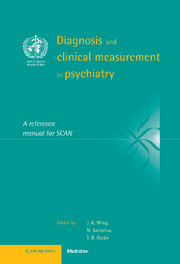Book contents
- Frontmatter
- Contents
- List of authors and SCAN Advisory Committee
- Preface
- Acknowledgements
- 1 Measurement and classification in psychiatry
- 2 The PSE tradition and its continuation in SCAN
- 3 Aims and structure of SCAN
- 4 The SCAN Glossary and principles of the interview
- 5 SCAN translation
- 6 Technical procedures
- 7 Training in the use of SCAN
- 8 International field trials: SCAN-0
- 9 SCAN-1: Algorithms and CAPSE-1
- 10 Development of SCAN-2.1
- 11 Computerisation of SCAN-2.1: CAPSE-2
- 12 Clinical, educational and scientific uses
- Subject index
1 - Measurement and classification in psychiatry
Published online by Cambridge University Press: 05 August 2016
- Frontmatter
- Contents
- List of authors and SCAN Advisory Committee
- Preface
- Acknowledgements
- 1 Measurement and classification in psychiatry
- 2 The PSE tradition and its continuation in SCAN
- 3 Aims and structure of SCAN
- 4 The SCAN Glossary and principles of the interview
- 5 SCAN translation
- 6 Technical procedures
- 7 Training in the use of SCAN
- 8 International field trials: SCAN-0
- 9 SCAN-1: Algorithms and CAPSE-1
- 10 Development of SCAN-2.1
- 11 Computerisation of SCAN-2.1: CAPSE-2
- 12 Clinical, educational and scientific uses
- Subject index
Summary
Why measure and classify
The formulation and development of medical disease concepts requires an interaction between two essential components. One is reliable recognition and labelling of a cluster of physical and/or psychological characteristics, regarded as undesirable because of the distress or disability that accompanies them. Sometimes a single characteristic is enough. The other is the testing of hypotheses concerning the relationship of these characteristics to damage and dysfunction in underlying biological systems (pathology) and to their causes (aetiology).
The terminology of symptoms, syndromes and disorders implies a hierarchical link to biological causes which, even if currently unknown, will eventually be empirically demonstrated. This assumption has often proved unwarranted. Probably more such clusters have proved useless or misleading than have successfully survived the process of scientific testing.
The approach to the categorization of mental disorders adopted in the latest International Classification of Diseases (ICD-10; WHO, 1992) is therefore appropriately cautious. The term ‘disorder’:
is used to imply the existence of a clinically recognizable set of symptoms or behaviour that in most cases is associated with distress and with interference with functions, always at the individual level and often at the group or social level (but not the latter only).
To make an ICD-10 diagnosis of mental disorder is not, therefore, to specify the presence of a disease, but to recognise the presence of the designated syndrome. It does, however, allow hypotheses concerning a pathology or other biological abnormality to be tested. The epidemiology of the disorder can be investigated and may provide a basis for further hypotheses. Another obvious test of usefulness is whether making the diagnosis is helpful to the individual concerned. Does it accurately predict forms of treatment that reduce disability without harmful side-effects? Does it give some idea of the future course and outcome? Are there means of primary, secondary or tertiary prevention? These are matters for scientific inquiry.
At the very least, can the person afflicted and family carers be given the consolation that the condition has a name, that there are other people with similar problems and that experiences and methods of coping can be shared?
- Type
- Chapter
- Information
- Diagnosis and Clinical Measurement in PsychiatryA Reference Manual for SCAN, pp. 1 - 11Publisher: Cambridge University PressPrint publication year: 1998
- 1
- Cited by



